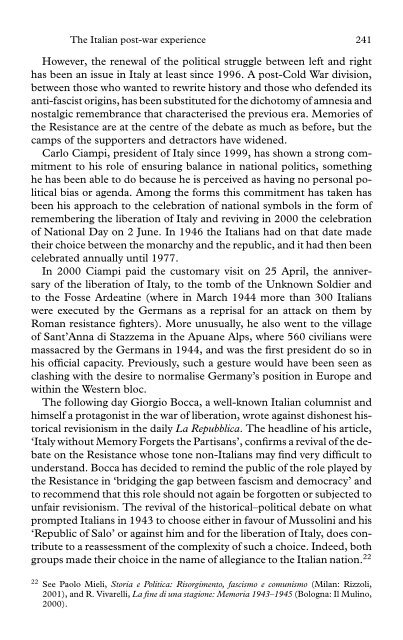Memory and Power in Post-War Europe: Studies in the Presence of ...
Memory and Power in Post-War Europe: Studies in the Presence of ...
Memory and Power in Post-War Europe: Studies in the Presence of ...
Create successful ePaper yourself
Turn your PDF publications into a flip-book with our unique Google optimized e-Paper software.
The Italian post-war experience 241<br />
However, <strong>the</strong> renewal <strong>of</strong> <strong>the</strong> political struggle between left <strong>and</strong> right<br />
has been an issue <strong>in</strong> Italy at least s<strong>in</strong>ce 1996. A post-Cold <strong>War</strong> division,<br />
between those who wanted to rewrite history <strong>and</strong> those who defended its<br />
anti-fascist orig<strong>in</strong>s, has been substituted for <strong>the</strong> dichotomy <strong>of</strong> amnesia <strong>and</strong><br />
nostalgic remembrance that characterised <strong>the</strong> previous era. Memories <strong>of</strong><br />
<strong>the</strong> Resistance are at <strong>the</strong> centre <strong>of</strong> <strong>the</strong> debate as much as before, but <strong>the</strong><br />
camps <strong>of</strong> <strong>the</strong> supporters <strong>and</strong> detractors have widened.<br />
Carlo Ciampi, president <strong>of</strong> Italy s<strong>in</strong>ce 1999, has shown a strong commitment<br />
to his role <strong>of</strong> ensur<strong>in</strong>g balance <strong>in</strong> national politics, someth<strong>in</strong>g<br />
he has been able to do because he is perceived as hav<strong>in</strong>g no personal political<br />
bias or agenda. Among <strong>the</strong> forms this commitment has taken has<br />
been his approach to <strong>the</strong> celebration <strong>of</strong> national symbols <strong>in</strong> <strong>the</strong> form <strong>of</strong><br />
remember<strong>in</strong>g <strong>the</strong> liberation <strong>of</strong> Italy <strong>and</strong> reviv<strong>in</strong>g <strong>in</strong> 2000 <strong>the</strong> celebration<br />
<strong>of</strong> National Day on 2 June. In 1946 <strong>the</strong> Italians had on that date made<br />
<strong>the</strong>ir choice between <strong>the</strong> monarchy <strong>and</strong> <strong>the</strong> republic, <strong>and</strong> it had <strong>the</strong>n been<br />
celebrated annually until 1977.<br />
In 2000 Ciampi paid <strong>the</strong> customary visit on 25 April, <strong>the</strong> anniversary<br />
<strong>of</strong> <strong>the</strong> liberation <strong>of</strong> Italy, to <strong>the</strong> tomb <strong>of</strong> <strong>the</strong> Unknown Soldier <strong>and</strong><br />
to <strong>the</strong> Fosse Ardeat<strong>in</strong>e (where <strong>in</strong> March 1944 more than 300 Italians<br />
were executed by <strong>the</strong> Germans as a reprisal for an attack on <strong>the</strong>m by<br />
Roman resistance fighters). More unusually, he also went to <strong>the</strong> village<br />
<strong>of</strong> Sant’Anna di Stazzema <strong>in</strong> <strong>the</strong> Apuane Alps, where 560 civilians were<br />
massacred by <strong>the</strong> Germans <strong>in</strong> 1944, <strong>and</strong> was <strong>the</strong> first president do so <strong>in</strong><br />
his <strong>of</strong>ficial capacity. Previously, such a gesture would have been seen as<br />
clash<strong>in</strong>g with <strong>the</strong> desire to normalise Germany’s position <strong>in</strong> <strong>Europe</strong> <strong>and</strong><br />
with<strong>in</strong> <strong>the</strong> Western bloc.<br />
The follow<strong>in</strong>g day Giorgio Bocca, a well-known Italian columnist <strong>and</strong><br />
himself a protagonist <strong>in</strong> <strong>the</strong> war <strong>of</strong> liberation, wrote aga<strong>in</strong>st dishonest historical<br />
revisionism <strong>in</strong> <strong>the</strong> daily La Repubblica. The headl<strong>in</strong>e <strong>of</strong> his article,<br />
‘Italy without <strong>Memory</strong> Forgets <strong>the</strong> Partisans’, confirms a revival <strong>of</strong> <strong>the</strong> debate<br />
on <strong>the</strong> Resistance whose tone non-Italians may f<strong>in</strong>d very difficult to<br />
underst<strong>and</strong>. Bocca has decided to rem<strong>in</strong>d <strong>the</strong> public <strong>of</strong> <strong>the</strong> role played by<br />
<strong>the</strong> Resistance <strong>in</strong> ‘bridg<strong>in</strong>g <strong>the</strong> gap between fascism <strong>and</strong> democracy’ <strong>and</strong><br />
to recommend that this role should not aga<strong>in</strong> be forgotten or subjected to<br />
unfair revisionism. The revival <strong>of</strong> <strong>the</strong> historical–political debate on what<br />
prompted Italians <strong>in</strong> 1943 to choose ei<strong>the</strong>r <strong>in</strong> favour <strong>of</strong> Mussol<strong>in</strong>i <strong>and</strong> his<br />
‘Republic <strong>of</strong> Salo’ or aga<strong>in</strong>st him <strong>and</strong> for <strong>the</strong> liberation <strong>of</strong> Italy, does contribute<br />
to a reassessment <strong>of</strong> <strong>the</strong> complexity <strong>of</strong> such a choice. Indeed, both<br />
groups made <strong>the</strong>ir choice <strong>in</strong> <strong>the</strong> name <strong>of</strong> allegiance to <strong>the</strong> Italian nation. 22<br />
22 See Paolo Mieli, Storia e Politica: Risorgimento, fascismo e comunismo (Milan: Rizzoli,<br />
2001), <strong>and</strong> R. Vivarelli, La f<strong>in</strong>e di una stagione: Memoria 1943–1945 (Bologna: Il Mul<strong>in</strong>o,<br />
2000).
















